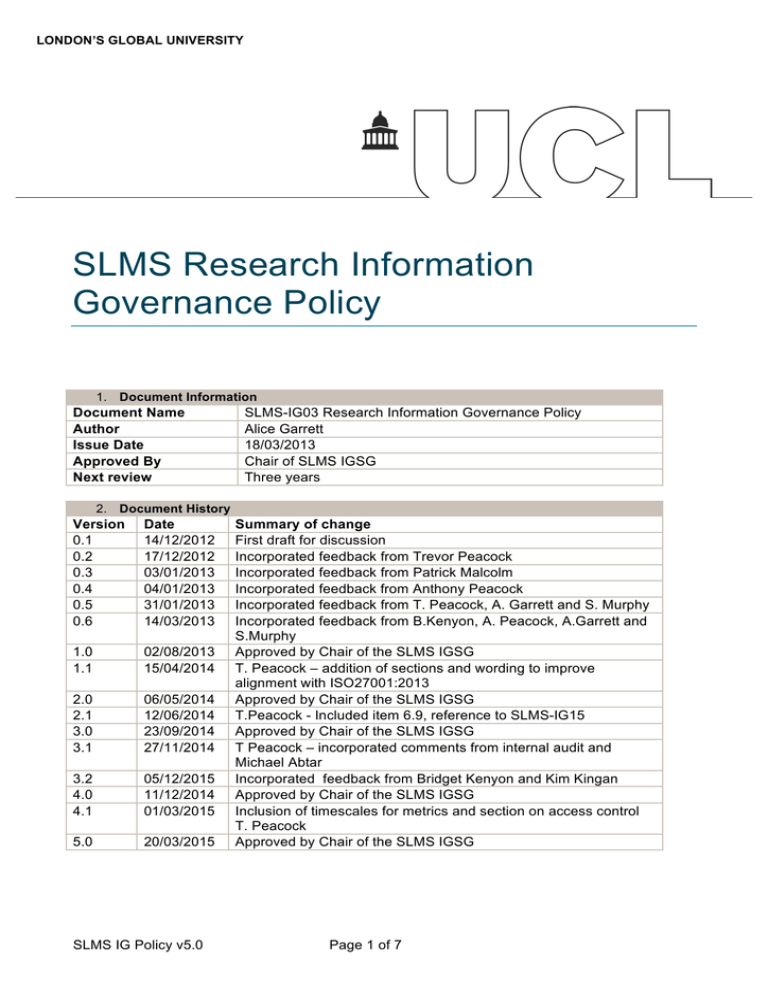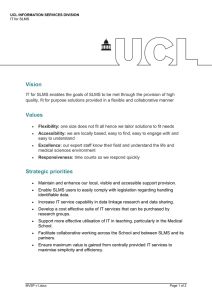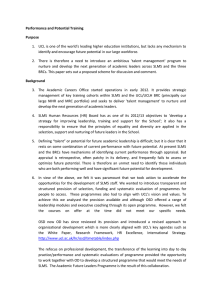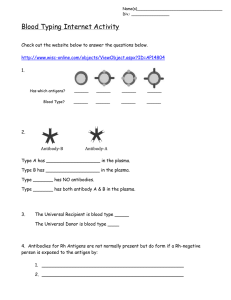SLMS Research Information Governance Policy
advertisement

LONDON’S GLOBAL UNIVERSITY SLMS Research Information Governance Policy 1. Document Information Document Name Author Issue Date Approved By Next review SLMS-IG03 Research Information Governance Policy Alice Garrett 18/03/2013 Chair of SLMS IGSG Three years 2. Document History Version 0.1 0.2 0.3 0.4 0.5 0.6 Date 14/12/2012 17/12/2012 03/01/2013 04/01/2013 31/01/2013 14/03/2013 1.0 1.1 02/08/2013 15/04/2014 2.0 2.1 3.0 3.1 06/05/2014 12/06/2014 23/09/2014 27/11/2014 3.2 4.0 4.1 05/12/2015 11/12/2014 01/03/2015 5.0 20/03/2015 SLMS IG Policy v5.0 Summary of change First draft for discussion Incorporated feedback from Trevor Peacock Incorporated feedback from Patrick Malcolm Incorporated feedback from Anthony Peacock Incorporated feedback from T. Peacock, A. Garrett and S. Murphy Incorporated feedback from B.Kenyon, A. Peacock, A.Garrett and S.Murphy Approved by Chair of the SLMS IGSG T. Peacock – addition of sections and wording to improve alignment with ISO27001:2013 Approved by Chair of the SLMS IGSG T.Peacock - Included item 6.9, reference to SLMS-IG15 Approved by Chair of the SLMS IGSG T Peacock – incorporated comments from internal audit and Michael Abtar Incorporated feedback from Bridget Kenyon and Kim Kingan Approved by Chair of the SLMS IGSG Inclusion of timescales for metrics and section on access control T. Peacock Approved by Chair of the SLMS IGSG Page 1 of 7 1.0 1.1 Information is a vital asset, both in terms of the world leading clinical research undertaken by University College London’s School of Life and Medical Sciences (SLMS) and in terms of the efficient management of services and resources. 1.2 Research projects within the SLMS frequently receive information from third parties including the NHS. As a result, the School is subject to additional responsibilities in satisfying information governance requirements and in safeguarding sensitive information. 1.3 It is therefore of paramount importance to ensure that information is efficiently managed, and that appropriate policies, procedures, management accountability and structures are in place to provide a robust governance framework for information management. 1.4 Accurate, timely and relevant information is essential to meeting the strategic academic goals of the SLMS; the general principles of which are covered in the UCL Data Protection and Information Security Policies. As such, it is the responsibility of all members of the SLMS to ensure that information is managed appropriately. 2.0 1.1 1 2 Introduction Scope of this Policy For the purposes of this and related policies, that form the Information Governance Framework outlined in 3.1 below, information is defined as data that can be stored in any format, including: • Structured record systems: paper and electronic; • Unstructured information: paper and electronic; • Transmission of information: fax, email, post, telephone, including text messages. 2.1 This policy covers all aspects of handling personal data1, sensitive personal data2 and other pseudonymised research data that could potentially identify individuals, within the SLMS, including information relating to past, present and potential research subjects. 2.2 This policy covers all information systems purchased, developed and managed by, or on behalf of, the SLMS and any individual directly employed or otherwise by the SLMS. 2.3 This policy is in addition to the UCL Data Protection Policy and applies to all staff and students of the SLMS and all other computer, network or information users authorized by the School or any department thereof. It relates to their use of any UCL-owned facilities (and those leased by or rented or on loan to UCL), centrally managed or otherwise; to all private systems (whether owned, leased, rented or on loan) when connected to the UCL network; to all UCL-owned or licensed information and programs (wherever stored); and to all information and programs provided to UCL by sponsors or external agencies (wherever stored). 2.4 For the avoidance of doubt where this SLMS policy is at variance with another UCL policy the more restrictive policy will apply. For definition please see Data Protection Act 1998 Section 1 For definition please see Data Protection Act 1998 Section 2 SLMS IG Policy v5.0 Page 2 of 7 3.0 3.1 Scope of Information Governance Information Governance is a framework to enable the SLMS to handle information including sensitive personal data, legally, securely, efficiently and effectively. It is formed of the following initiatives and related policy documents: Initiative 4.0 Policy document Information Governance Management SLMS-IG03 Research Information Governance Policy Information Security Assurance UCL Information Security Policy Confidentiality & Data Protection Assurance UCL Data Protection Policy Principles 4.1 The SLMS recognises the need for an appropriate balance between openness and confidentiality in the management and use of information. 4.2 The SLMS fully supports the principles of corporate governance and recognises its public accountability, but equally places importance on the confidentiality of, and the security arrangements to safeguard, personal information about research subjects. 4.3 The SLMS also recognises the need to share personal and sensitive personal data with other organisations and agencies in a controlled manner consistent with the interests of the subject and, in some circumstances, the public interest. 4.4 The SLMS believes that accurate, timely and relevant information is essential to world leading research and the strategic academic goals of UCL. As such, it is the responsibility of all members of the SLMS to ensure that information is managed appropriately. The SLMS will work with information providers to ensure that research subjects are aware of the need to hold their personal information, the processes that the SLMS uses, and the rights they hold as data subjects. 4.5 The SLMS undertakes to maintain high standards of information handling by reference to the HORUS model, where information is: § § § § § Held securely and confidentiality; Obtained fairly and efficiently; Recorded accurately and reliably; Used effectively and ethically; Shared appropriately and lawfully. 4.6 The SLMS seeks to protect its computer systems from misuse and to minimise the impact of service breaks through conformance with the standard ISO/IEC 27001:2013 and the continual development of an Information Security Management System (ISMS). 4.7 The SLMS will ensure that the personal and sensitive personal data within its control are held, retained, and disposed of in line with good practice and the law. 4.8 The SLMS will obtain and share information in compliance with the common law duty of confidentiality. SLMS IG Policy v5.0 Page 3 of 7 5.0 5.1 Information Security Objectives and Continual Improvement The objective of this organisation is to enable research to be carried out on identifiable data in a suitably secure manner. This is measurable by: Objective Appropriate management of risk Metric Timeframe Target The proportion of relevant studies / teams using the Data Safe Haven Annually by the end of each calendar year 10% The level of risk within the organisation as assessed by our partners Quarterly IGSG No degradation of risk The level of risk within the organisation as measured in the UCL Data Safe Haven Risk Assessment Annually by the end of each calendar year All risks are ‘green’ Compliance with requirements of external parties The success rate of NHS IG Toolkit submissions Quarterly IGSG 95% Manage risk of: The number of staff receiving training and awareness and the effectiveness of it Annually by the end of each calendar year 560 per year User deliberately or accidentally leaks information User accidentally or deliberately damages information 90% pass rate 5.2 The above metrics, together with audit observations will be monitored to ensure a continual improvement in information security 5.3 More detailed information security objectives shall be detailed in the IG Improvement plan. The plan shall be reviewed annually or as the result of significant organisational or legislative change and updated to include: i. additional requirements relating to the latest version of the NHS IG Toolkit ii. improvements identified through risk assessment and risk treatment 5.4 In response to the above assessment, the SLMS will formulate an Information Governance Improvement Plan each year, which will detail the action plans that have been raised through the IG Toolkit and ISMS, along with risks and benefits. 5.5 An annual ISO/IEC 27001 compliance audit shall be carried out to ensure that the Information Security Management System (ISMS) is suitable, adequate and effective for the needs of this organisation. SLMS IG Policy v5.0 Page 4 of 7 6.0 6.1 Legal and Regulatory Requirements Legislative and statutory: The Data Protection Act 1998 (DPA), is enacted by the Information Commissioner’s Office. The UCL Data Protection Officer acts as a point of liaison between UCL and the ICO on these matters. The UCL Data Protection Office is responsible for the data protection registration of studies within the organisation and for ensuring compliance with the DPA and Common Law Duty of Confidentiality. The Data Protection Officer is a member of the SLMS IGSG to advise on DPA matters and to report on developments in this area 6.2 The Confidentiality Advisory Group (CAG), under the Health Research Authority (HRA) oversees applications under the Health Service (Control of Information) Regulations 2001 - Section 251 of the NHS Act 2006. The IG Lead has regular contact with the HRA. 6.3 Recital 26 and Article 27 of the European Data Protection Directive (95/46/EC) in relation to anonymisation and pseudonymisation 6.4 Regulatory: The HSCIC manages information governance assurance for a number of data sources, including the Office of National Statistics (ONS), Hospital Episode Statistics (HES) 6.5 The HSCIC also manages the Department of Health’s IG Toolkit, of which the Hosted Secondary Use Team / Project (HSUTP) ‘view’ is a requirement for applications under Section 251 (see legislative and statutory section above) and also for HES and in many cases, for working with data from other sources within the NHS. The IG Toolkit is revised annually so processes and documentation needs to be kept up to date. 6.6 The organisation’s Information Security Management System complies with ISO/IEC 27001:2013 6.7 Medical trials are subject to audit by the Medical and Healthcare products Regulatory Agency (MHRA) which includes audit of information security 7.0 Management & Accountability 7.1 Information Governance management across the SLMS will be coordinated by the Information Governance Steering Group, the Terms of Reference for which are defined in ‘SLMS-IG01 IG Steering Group Terms of Reference’. 7.2 The SLMS Information Governance Steering Group will be accountable to the SLMS Senior Executive Group. 7.3 The SLMS Information Governance Lead and Senior Information Risk Owner (SIRO) will be an Executive Director with responsibility for Information Governance within the SLMS. 7.4 Roles and responsibilities are detailed in SLMS-IG32 SLMS IG Framework Roles and Responsibilities 7.5 Additional guidance is given in SLMS-IG04 SLMS Confidentiality Code of Conduct’. Where there is a deliberate, or totally negligent breach of this policy, the matter will be dealt with under the UCL Disciplinary Policy and Procedure. UCL wishes to encourage a transparent and open “lessons learnt” culture. Consequently, UCL will deal sympathetically with all breaches, providing guidance and training to those impacted by the breach when such breaches are found to be accidental. SLMS IG Policy v5.0 Page 5 of 7 7.6 8.0 Information security is everyone’s responsibility; all information incidents must be reported promptly and openly in accordance with SLMS-IG15 Information Reporting Procedure Awareness & Training 8.1 Information Governance training shall be included as standard for staff inductions. 8.2 All staff and researchers shall complete the SLMS IGSG’s approved Information Governance Training. 8.3 Supplementary or role-based training shall be given, or organised, where necessary; this can be requested by an individual wanting personal development or arranged at the discretion of a manager. 8.4 The SLMS shall also ensure that awareness of Information Governance and related matters is maintained and measured, and that new advice or initiatives are communicated through a wide range of different channels. 9.0 Risk 9.1 10.0 In consultation with the SIRO, PIs will ensure that the study/team improvement plan accurately reflects any data protection and privacy risks run by their projects/team and that suitable remediation plans are in place to manage/eliminate these risks. For more detail see SLMS-IG06 IG Improvement Plan. Review and monitoring of compliance 10.1 This policy will be reviewed every two years (or sooner if new legislation, codes of practice or national/international standards are introduced or revised). 10.2 The implementation and compliance with this Policy will be monitored by the IGSG. 10.3 UCL will seek to undertake or commission a range of audits when and where necessary and reports will be presented to the IGSG to monitor compliance. Action plans will be devised to deal with any identified issues. 10.4 Compliance with this policy will be monitored during the investigation of complaints or incidents and identified risks. 11.0 Access Control 11.1 The SLMS will ensure that confidentiality of data is maintained and access granted appropriately and only to authorised personnel. There must be a clear separation of access rights where different members of a single team are working on separate data sets. 11.2 Users shall only be provided with access to the network and network services that they have been specifically authorized to use. 11.3 A formal user registration and de-registration process shall be implemented to enable assignment of access rights. 11.4 A formal user access provisioning process shall be implemented to assign or revoke access rights for all user types to all systems and services. 11.5 Access to systems and applications shall be controlled by a secure log-on procedure. The allocation of secret authentication information shall be controlled through a formal management process. SLMS IG Policy v5.0 Page 6 of 7 11.6 The allocation and use of privileged access rights shall be restricted and controlled. Password management systems shall be interactive and shall ensure quality passwords. 11.7 Asset owners shall review users’ access rights at regular intervals. 11.8 The access rights of all employees and external party users to information and information processing facilities shall be removed upon termination of their employment, contract or agreement, or adjusted upon change. SLMS IG Policy v5.0 Page 7 of 7



